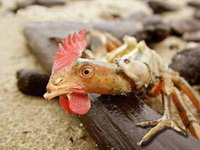Countries to share bird flu virus samples
U.N. health officials agreed to share bird flu virus samples, but said only time would tell how it would actually work.

The preliminary deal reached Tuesday at the World Health Assembly after months of debate and strong opposition from developing countries outlines in broad terms how governments will work together to combat the threat of bird flu.
But its implementation is voluntary, and exceptions are possible.
"If countries wish to make exceptions, they will make exceptions," said Dr. David Heymann, WHO's top bird flu official.
"We will have an opportunity to see over the next few weeks, as we begin to request the viruses, if there are any conditions on (using) the viruses as they are sent in," he told The Associated Press.
Indonesia stopped sharing virus samples with the international community last year, despite being the nation hardest-hit by H5N1. The country recently sent virus samples from two patients to a WHO-accredited laboratory in Japan after assurances that they would not be passed on to private pharmaceutical companies without its permission.
China, which has not shared virus specimens with WHO for almost a year, has also reportedly sent samples to the U.S. Centers for Disease Control and Prevention in Atlanta. WHO spokesman Gregory Hartl said they were due to arrive at the weekend.
The global health body hopes countries will allow the samples to be used for risk assessment, development of non-commercial diagnostic tests and vaccine development, Heymann said.
A number of developing countries, led by Indonesia, argue that the existing system of unconditional sample sharing puts poorer nations at a disadvantage because they are unable to afford commercial vaccines. This is doubly unfair because the vaccines might have been created from virus samples the poor countries supplied to WHO.
An expert meeting in the summer will propose specific criteria under which countries will share virus samples with WHO and international health experts.
Until then, the terms of the current agreement under which the WHO's 193 members "urge" each other to share samples for risk assessment and pandemic preparedness would stand, Haymann said.
The interim deal reached in Geneva this week also urges WHO to negotiate with companies developing vaccines to set aside reserves for poor countries in case of a pandemic.
Details about how the stockpile would be created, who would pay for it and how long the vaccines would remain viable are unclear.
Building a vaccine stockpile also depends on producer countries agreeing to release stocks in the event of a pandemic, something that might not be possible under current emergency legislation.
"Some countries have on the record laws that say that, should there be a pandemic, (they) cannot export any vaccine until (their) national domestic needs are satisfied." Heymann said. He did not name countries which have such laws, but most vaccines are produced in Europe, Canada and the United States.
According to WHO officials, some 10 to 12 vaccines are currently being developed, of which nine have shown promising laboratory results. Any effective vaccine would have to be adapted to the specific type of flu virus causing the pandemic, and vaccine production facilities have to be increased.
"The world is not prepared for a pandemic should it occur today. We don't have enough vaccine," Heymann said.
At present the global vaccine production capability stands at 500 million "trivalent" doses - meaning it would protect against three types of viruses. This could be increased to 1.5 billion doses once the exact pandemic strain is known.
"In a world of 6.2 billion that's not enough vaccine," he said.
Subscribe to Pravda.Ru Telegram channel, Facebook, RSS!


